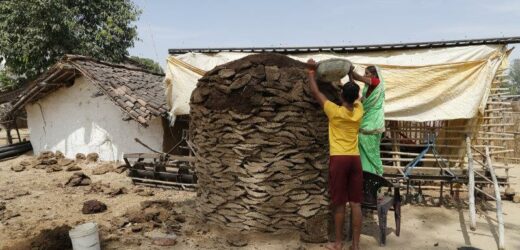Ahmedabad: Doctors in India are warning against the practice of using cow dung in the belief it will ward off COVID-19.
The professionals say there is no scientific evidence for its effectiveness and that it risks spreading other diseases.
The coronavirus pandemic has wrought devastation on India, with 22.66 million cases and 246,116 deaths reported so far, with the variant classified by the World Health Organisation as being of “global concern”.
Experts say actual numbers could be five to 10 times higher, and citizens across the country are struggling to find hospital beds, oxygen, or medicines, leaving many to die for lack of treatment.
Villagers pile up cow dung to prepare cow dung cake, used as fuel, at Ganeshpur village, Uttar Pradesh state, India.Credit:AP
In the state of Gujarat in western India, some believers have been going to cow shelters once a week to cover their bodies in cow dung and urine in the hope it will boost their immunity against, or help them recover from, the coronavirus.
In Hinduism, the cow is a sacred symbol of life and the earth, and for centuries Hindus have used cow dung to clean their homes and for prayer rituals, believing it has therapeutic and antiseptic properties.
“We see … even doctors come here. Their belief is that this therapy improves their immunity and they can go and tend to patients with no fear,” said Gautam Manilal Borisa, an associate manager at a pharmaceuticals company, who said the practice helped him recover from COVID-19 last year.
He has since been a regular at the Shree Swaminarayan Gurukul Vishwavidya Pratishthanam, a school run by Hindu monks that lies just across the road from the Indian headquarters of drug maker Zydus Cadila, which is developing its own COVID-19 vaccine.
As participants wait for the dung and urine mixture on their bodies to dry, they hug or honour the cows at the shelter, and practice yoga to boost energy levels. The packs are then washed off with milk or buttermilk.
Doctors and scientists in India and across the world have repeatedly warned against practising alternative treatments for COVID-19, saying they can lead to a false sense of security and complicate health problems.
Cremation amid India’s massive outbreak.Credit:AP
The B.1.617 variant is the fourth variant to be designated as being of global concern and requiring heightened tracking and analysis. The others are those first detected in Britain, South Africa and Brazil.
“We are classifying this as a variant of concern at a global level,” Maria Van Kerkhove, WHO technical lead on COVID-19, told a briefing. “There is some available information to suggest increased transmissibility.”
Indian coronavirus infections and deaths held close to record daily highs on Monday, increasing calls for the government of Prime Minister Narendra Modi to lock down the world’s second-most populous country.
The WHO has said the predominant lineage of B.1.617 was first identified in India in December, although an earlier version was spotted in October 2020.
The variant has already spread to other countries, and many nations have moved to cut or restrict movements from India.
Reuters
Most Viewed in World
From our partners
Source: Read Full Article




